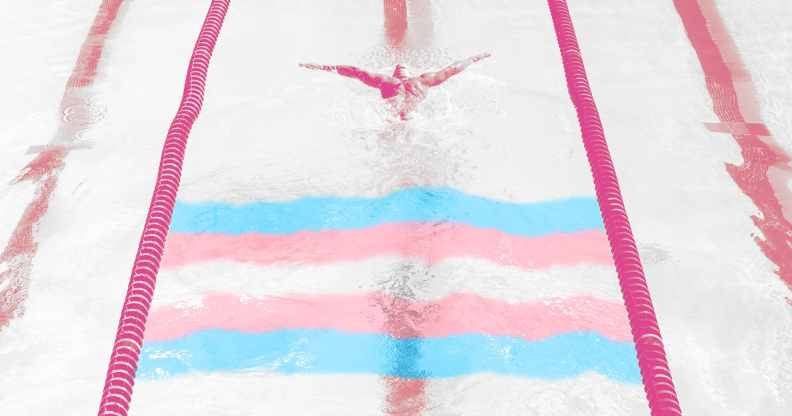‘Safe, inclusive’ trans and non-binary swimming sessions are helping young people thrive

An LGBTQ+ charity is putting on private swimming lessons for young trans people. (Getty/PinkNews)
An LGBTQ+ charity is fighting to overcome transphobia around sports with private swimming sessions for trans and non-binary people.
East England charity The Kite Trust is aiming to make life for LGBTQ+ youths and young adults just that bit easier with a plethora of sports sessions, events, training packages and support to help build acceptance and confidence in the community.
It comes after several elite-level governing bodies updated their inclusion policies, enacting harsh restrictions or simply banning trans athletes outright.
This includes the international swimming body FINA, which effectively banned trans women from international swimming competitions by restricting the women’s category to those who have “not experienced a male puberty” after the age of 12.
These moves, and the wider, loaded discourse around trans people – women especially – participating in sports, makes simply going to the gym or leisure centre daunting for many trans people, especially those who are newly out.
“It can feel vulnerable, [for trans and non-binary] young people to enter a swimming space,” Kite Trust operations manager Katie Girling-Weeks told PinkNews.
The charity’s team of staff and volunteers realised that the community wanted to be able to swim safely and enjoyably.
“People were saying, ‘you know, I just really miss swimming’. It’s a lovely sport,” they continued. “But it’s one of the first that gets put on the cut list for trans, non-binary, and gender-questioning youth because it can be very exposing for young people to enter that space.”

Young competitive swimmers racing in an outdoor pool. (Thomas Barwick/Getty)
After gaining funding from local councils, board members established a set of swimming events over the course of several months.
“We provide two distinct sessions. One of those is for our service users – for those who are already registered with us – and the other is an open session for trans, non-binary or gender questioning adults that are open to our wider community to join us”
“They really are just an opportunity for people to relax, connect, and swim in a safe, inclusive space where their identities are celebrated.”
For the Kite Trust, participation is one of the most important steps in establishing a sense of normality in an LGBTQ+ young person’s life.
While affirmation is important, especially considering the onslaught of anti-trans rhetoric in the UK, allowing trans people to simply join in with things that seem second nature to most is incredibly vital to help build their confidence.
“We want to encourage trans youth to participate more in sport, to have the same experiences and opportunities as every other young person,” Girling-Weeks continued.
But, they added, it’s vital to make sure it’s “in a safe and inclusive space, so that we’re not setting them up in a transphobic space that we’re not aware of”.
“The young people that we work with, they’re so connected and so aware of everything that’s going on around them,” Girling-Weeks added.
“We try so hard to empower them and to improve their confidence and self-esteem because transphobia is everywhere at the moment and it’s getting so loud. Unfortunately, it’s something that, in terms of sport, is completely trickling down to that grass-roots level.”
Despite experts saying there is no concrete evidence to suggest trans athletes have an explicit physical advantage over competitors, complacent trans exclusion has only got worse in sports.
One of the most recent examples is the Irish Rugby Union (IRFU) banning trans women from contact rugby on “medical and scientific evidence”.
But this negativity hasn’t stopped The Kite Trust from pushing its members to be their best selves.
The charity, established in 1993, supports “the well-being and creative of LGBTQ+ people up to the age of 30”, Girling-Weeks explains, working to reduce social isolation, improve self-esteem and confidence, and enable young people to learn new skills.
“We are led by people with lived experience which is really important to the organisation. The majority of our board and 93 per cent of our staff identify as LGBTQ+ and 73 per cent identify as trans or non-binary,” Girling-Weeks continued.
Even outside the realm of sports, board members and volunteers take pride in even the simplest achievements, because it’s the little things that really count in the face of rising stigma.
“Heartwarming and positive don’t even come close to how transformative our services are. They really are transformative to the young people that we work with and the domino effect that the positivity can have on their lives is huge. We’re so proud to do that work.”
Follow The Kite Trust on EventBrite for upcoming swimming sessions.

